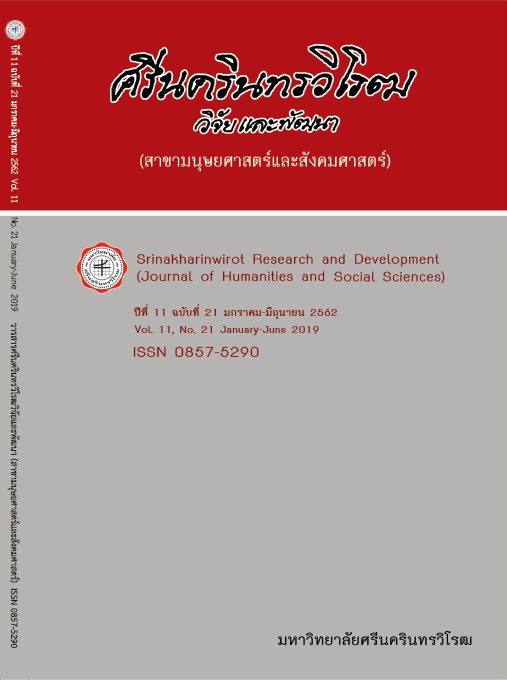อิทธิพลของทรัพยากรในงานและความมุ่งมั่นในการทำงานที่มีต่อผลการปฏิบัติงาน ของพนักงานธนาคารพาณิชย์ของรัฐ ในนครหลวงเวียงจันทน์ สปป.ลาว THE INFLUENCE OF JOB RESOURCES AND WORK ENGAGEMENT ON EMPLOYEES’ PERFORMANCE IN STATE-OWNED COMMERCIAL BANK IN VIENTIANE CAPITAL, LAO PEOPLE’S DEMOCRATIC REPUBLIC
Keywords:
Job Resources, Work Engagement, Employees’ Performance, State-owned Commercial BankAbstract
The objectives of this study were: 1) to assess the level of job resources, work engagement and employees’ performance 2) to study the influence of job resources on work engagement 3) to study the influence of job resources on employees’ performance 4) to study the influence of work engagement on employees’ performance and 5) to study the Indirect influence of job resources on employees’ performance. The population was bank's operating employees in state-owned commercial bank in Vientiane Capital, Lao PDR. Data was collected by using questionnaire and the sample size of the study was 313 people. For the descriptive part, the basic statistics were used such as percentage, mean, and standard deviation and structural equation modeling (SEM) was sued for testing hypotheses.
The results revealed that the overall job resource of state-owned commercial bank in Vientiane Capital, Lao PDR was at the moderate level. The overall work engagement was at high level, and overall performance was at a high level. Based on the result of SEM analysis, the model was fitted with data as well, the goodness of fit indices was as followed; c2/df = 1.457, p-value = 0.112, GFI = 0.985, AGFI = 0.956, CFI = 0.997, NFI = 0.989, RMR = 0.012 and RMSEA = 0.038. The variables in the proposed model could explain the employees’ performance accounted for 64.0% of the total variance. The job resource was positively influences with work engagement and statistic significantly at the level of .001. The job resource has direct and indirect positively influences on employees’ performance and statistic significantly at .001. In addition, the work engagement was positively influences with the employees’ performance and statistic significantly at .001
Downloads
References
[2] Schaufeli, W. B., M. Salanova, V. Gonzáles-Romá; and A. B. Bakker. (2002). The measurement of engagement and burnout: A two sample confirmatory factor analytic approach. Journal of Happiness Studies. 3: 71-92.
[3] Libano, M. D., S. Llorens, M. Salanova; and W. B. Schaufeli. (2012). About the dark and bright sides of self-efficacy: Workaholism and work engagement. The Spanish Journal of Psychology. 15(2): 688-701.
[4] Haynie, J. H., K. W. Mossholder; and S. G. Harris. (2016). Justice and job engagement: The role of senior management trust. Journal of Organizational Behavior. 37: 889–910.
[5] Caesens, G.; and F. Stinglhamber. (2014). The relationship between perceived organizational support and work engagement: The role of self-efficacy and its outcomes. Revue européenne de psychologie appliquée. 64: 259-267.
[6] Matthews, L. M., A. R. Zablah, J. F. Hair; and G. W. Marshall. (2016). Increased engagement or reduced exhaustion: Which accounts for the effect of job resources on salesperson job outcomes?. Journal of Marketing Theory and Practice. 24(3): 249–264.
[7] Schaufeli, W. B.; and A. B. Bakker. (2004). Job demand, job resources, and their relationship with burnout and engagement: A multi-sample study. Journal of Organizational Behavior. 25: 293-315.
[8] ธนาคารแห่ง สปป.ลาว. (2559). ยุทธศาสตร์การพัฒนาสถาบันการเงิน-เงินตราของ สปป.ลาว ระยะ 10 ปี 2559-2568 และวิสัยทัศน์ถึงปี 2573. ม.ป.พ.
[9] Sim, H. P., A. D. Szilagyi; and R. T. Keller. (1976). The measurement of job characteristics. Academy of Management Journal. 19(2): 195-212.
[10] Hammer, T. H., Q. P. Saksvik, K. Nytrø, H. Torvatn; and M. Bayazit. (2004). Expanding the psychosocial work environment: Workplace norms and work–family conflict as correlates of stress and health. Journal of Occupational Health Psychology. 9(1): 83–97.
[11] Karatepe, O. M.; and O. A. Olugbade. (2009). The effects of job and personal resources on hotel employees’ work engagement. International Journal of Hospitality Management. 28: 504–512.
[12] Schaufeli, W. B., A. Bakker; and M. Salanova. (2006). The measurement of work engagement with a short questionnaire: A cross-national study. Educational Psychological Measurement. 66(4): 701-716.
[13] Goodman, S. A.; and D. J. Svyantek. (1999). Person-organization fit and contextual performance: Do shared values matter. Journal of Vocational Behavior. 55(2): 254-275.
[14] สุพัตรา จุณณะปิยะ. (2546). คู่มือการวิจัยทางรัฐศาสตร์และรัฐประศาสนศาสตร์. กรุงเทพฯ: โรงพิมพ์ชุมนุมสหกรณ์การเกษตรแห่งประเทศไทยจำกัด.
[15] กัลยา วานิชย์บัญชา. (2556). การวิเคราะห์สมการโครงสร้าง (SEM) ด้วย AMOS. กรุงเทพฯ: ห้างหุ้นส่วนจำกัดสามลดา.
[16] จารุวรรณ ยอดระฆัง. (2554). การทดสอบแบบจำลองปัจจัยเอื้อต่อการทำงานและทรัพยากรส่วนบุคคลที่มีอิทธิพลต่อการริเริ่มด้วยตนเองภายใต้บทบาทสื่อของความผูกพันในงาน. วิทยานิพนธ์ศิลปศาสตรมหาบัณฑิต (จิตวิทยาอุตสาหกรรมและองค์การ). มหาวิทยาลัยธรรมศาสตร์.
[17] ผดารัช สีดา. (2555). อิทธิพลของแหล่งทรัพยากรที่เอื้อต่องานและข้อเรียกร้องในงานของพนักงานโดยมีความผูกใจมั่นในงานและความเหนื่อยหน่ายในงานเป็นตัวแปรส่งผ่าน. วิทยานิพนธ์ศิลปศาสตรมหาบัณฑิต (จิตวิทยาอุตสาหกรรมและองค์การ). จุฬาลงกรณ์มหาวิทยาลัย.
[18] สิริพร ทรัพยะประภา. (2555). อิทธิพลของแหล่งทรัพยากรที่เอื้อต่องานและข้อเรียกร้องในงานต่อความผูกใจมั่นในงานโดยมีทุนทางจิตวิทยาเป็นตัวแปรส่งผ่าน. วิทยานิพนธ์ปริญญาศิลปศาสตรมหาบัณฑิต (จิตวิทยา). จุฬาลงกรณ์มหาวิทยาลัย.
[19] ดาริกา ปิตุรงคพิทักษ์. (2557). โมเดลความสัมพันธ์เชิงสาเหตุระหว่างความต้องการในงาน ทรัพยากรในงานสุขภาวะและการจัดแจงในงาน กับความผูกพันในงานของพนักงาน. วิทยานิพนธ์ปรัชญาดุษฎีบัณฑิต
(จิตวิทยาอุตสาหกรรมและองค์การ). มหาวิทยาลัยเทคโนโลยีพระจอมเกล้าพระนครเหนือ.
[20] กำไล ปราณี. (2559). ความสัมพันธ์เชิงสาเหตุระหว่างปัจจัยเอื้อในการทำงาน การจัดการแบบเชิงรุกความผูกพันในงานและความเหนื่อยล้าในงานของครูโรงเรียนมัธยมศึกษา. วิทยานิพนธ์วิทยาศาสตร
มหาบัณฑิต (การวิจัยและสถิติทางวิทยาการปัญญา). มหาวิทยาลัยบูรพา.
[21] Metin, U. B., T. W. Taris, M. C. W. Peeters, I. V. Beek; and R. V. V. D. Bosch. (2015). Authenticity at work – a job-demands resources perspective. Journal of Managerial Psychology. 31(2): 483-499.
[22] Yuan, Z., Y. Li; and L. E. Tetrick. (2015). Job hindrances, job resources, and safety performance: The mediating role of job engagement. Applied Ergonomics. 51: 163-171.
[23] Bakker, A. B.; and P. M. Bal. (2010). Weekly work engagement and performance: A study among starting teachers. Journal of Occupational and Organizational Psychology. 83: 189-206.
[24] ยุทธการ ก้านจักร. (2554). การรับรู้วัฒนธรรมองค์การ การบริหารทรัพยากรมนุษย์ ความยึดมั่นผูกพันในงานกับผลการปฏิบัติงานของพนักงานการท่าเรือแห่งประเทศไทย. วิทยานิพนธ์วิทยาศาสตรมหาบัณฑิต (จิตวิทยาอุตสาหกรรมและองค์การ). มหาวิทยาลัยเกษตรศาสตร์.
[25] นวลพรรณ ชื่นประโยชน์. (2554). ความเหนื่อยหน่ายในการทำงาน ความผูกพันในงานและความสามารถในการฟันฝ่าอุปสรรค ต่อผลการปฏิบัติงานของพนักงานสินค้าเกษตรส่งออก. วิทยานิพนธ์ศิลปศาสตรมหาบัณฑิต (จิตวิทยาอุตสาหกรรมและองค์การ). มหาวิทยาลัยธรรมศาสตร์.
[26] มนพะงา เล็กขาว. (2557). ความมุ่งมั่นในการทำงาน และการปฏิบัติงาน: กรณีศึกษา กรมป้องกันและบรรเทาสาธารณภัย. ปรัชญาดุษฎีบัณฑิต (รัฐประศาสน์ศาสตร์). มหาวิทยาลัยรามคำแหง.
[27] Rich, B.L., J.A. Lepine; and E.R. Crawford. (2010). Job engagement: Antecedents and effects on job performance. Academy of Management Journal. 53(3): 617–635.
Downloads
Published
How to Cite
Issue
Section
License
Srinakharinwirot Research and Development Journal of Humanities and Social Sciences is licensed Under a Creative Commons Attribution-NonCommercial-NoDerivs 4.0 International (CC-BY-NC-ND 4.0) License, Unless Otherwise Stated. Please Read Journal Policies Page for More Information on Open Access, Copyright and Permissions.



